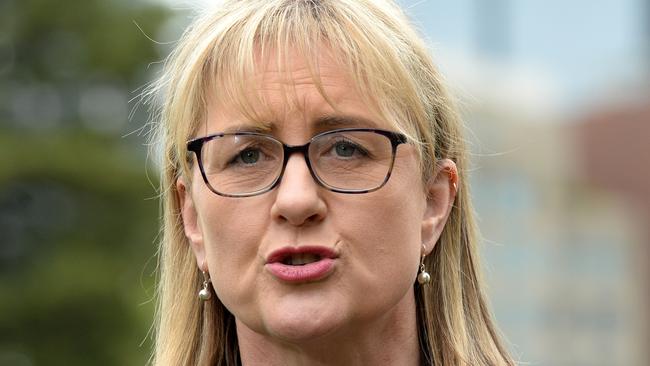Victorian Deputy Premier Jacinta Allen coy on ISIS wives and children
Victoria’s Deputy Premier Jacinta Allan has repeatedly refused to say whether Victoria will agree to take back families from ISIS camps in Syria.

Victoria’s Deputy Premier Jacinta Allan has repeatedly refused to say whether Victoria will agree to take back families from ISIS camps in Syria, despite NSW accepting four families including 13 children.
Ms Allan six times refused to answer whether Victoria would take back some of the Melbourne-based families who are likely to be repatriated from the camps in Syria in coming months, telling ABC Radio it was “not a yes or no proposition’’.
Repeatedly referring the matter to the federal government and Department of Home Affairs, Ms Allan said any decision to take families back was a “very sensitive security matter’’ that was “primarily the province of the federal government.’’
The Andrews government is believed to be on a go-slow in preparing for the families to be repatriated, and thought to be trying to avoid controversy before the state election this month.
By contrast, the Perrottet government in NSW, which goes to the polls next year, has taken back four women and 13 children, albeit with concerns about the potential risk and cost, and making clear the repatriation decision was taken by the federal government, not the state.
The group brought back last week was deemed by federal authorities to be the most vulnerable among 58 women and children in the al-Roj camp in northeast Syria near the Iraqi border.
Some of the 12 women and 29 children who remain in the camp, including several families from Melbourne, are considered more problematic in terms of conduct, and have complex family issues which will likely need a greater level of intervention from state agencies such as child welfare.
The row comes as some of the women and their children who were returned to Australia were filmed enjoying a sociable meal at a McDonalds’ outlet in western Sydney on Tuesday.
Mariam Dabboussy and her three children, who had spent three years and seven months in a camp in Syria, and her father Kamalle Dabboussy, an advocate for returning the families, went for a meal and to play in the park.
The vision of them enjoying their freedom in Sydney will be distressing for communities who were forced to flee their homes because of ISIS, including the Yazidi and Assyrian people who were raped, murdered and enslaved during the group’s brutal reign of terror in Syria and Iraq.
The decision to return the families – the wives, widows and children of dead or detained ISIS fighters – is broadly unpopular with the public, and has opened the government up to criticism from voters who do not believe the families should have been able to return.
Prime Minister Anthony Albanese and Home Affairs Minister Clare O’Neil have said the decision was made on national security advice.
The Australian has been told over a period of several months that Victorian officials have not been engaging strongly on the families’ potential return, and that preparation was “behind the eight-ball’’ compared to NSW, which has been holding joint agency meetings for several months to prepare a repatriation plan. Several people have said the Victorian government wanted to avoid any controversies before next month’s election.
Human Rights Watch Australia’s Sophie McNeill said the first four families had been chosen for return because they were the most vulnerable, with small children and some serious illnesses which were well-documented.
“We really are calling on all state governments to co-operate here, it is essential the remaining families are brought here as soon as possible because we are really concerned about them enduring another winter,” Ms McNeil said.
“It is disappointing for (Ms Allan) to avoid commenting, we don’t want to have them turned into a political football.”
The women are the first adults to be brought back from the camps since the fall of ISIS in March 2019. In July 2019, two groups of orphans were brought back to Australia.




To join the conversation, please log in. Don't have an account? Register
Join the conversation, you are commenting as Logout